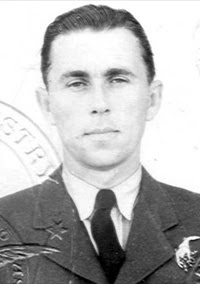He was a navigator, born on 11th March 1913 in Elizawetgradzie (now known as Kirowograd) near Odessa.The family left for Russia, because his father received a job there. Later the family returned to Poland, where he was educated and graduated with an engineering degree in 1938. After graduation he was conscripted and served in the Reserve Officers School of Communication at Zegrze close to Warsaw.
As a soldier, at the beginning of the war, he was posted to the airport at Lvov. After the Russian invasion, he was evacuated to Romania where he was interned. He escaped on the first night and made his way, through Jugoslavia, to Marseille, France and on to the Polish base at Lyon-Bron then on again to Normandy where he took on civilian work after being demobilised in May 1940. The reason for this is not given.
After the Fall of France, he moved into Vichy territory where he worked for two years as a tennis coach and worked his way through University at Grenoble, where he gained another degree in electrical engineering. At this time, he was active in the French Resistance. At the end of 1942 he decided to re-enlist in the Polish military and, in the summer of 1943, he was sent to Canada for training at the British Gunnery School No 1 in Jarvis, Ontario. He trained as a gunner and bomb aimer on Avro Ansons, Westland Lysanders, Fairey Battles and Bristol Bolingbrokes. Subsequently he went to Malton, Ontario for navigator training at No 1 Air Observation School and the General Reconnaissance School on Prince Edward Island, the smallest of Canada’s Provinces.
In October 1944 he returned to Britain and was posted to RAF Silloth, where he trained on Wellingtons. In December 1944 he was posted to 304 Squadron who were then at RAF Benbecula carrying out anti-submarine patrols. On his ninth mission, in April 1945, his crew attacked a U-Boat and observed oil on the surface of the sea; they were credited with probable damage. This was the last ever attack by 304 Squadron on a U-Boat.
He remained with the squadron until he was demobilised at the end of 1946. He was awarded the Cross of Valour and the Bronze Cross of Merit with Swords. He decided to return to Poland and arrived back in Gdansk on 23rd July 1947.
He settled in Krakow and worked as a designer of high voltage electricity grids and won the highly prestigious State Prize for the first 400Kv network near Wroclaw. He then worked as a university lecturer in the faculty of electrical engineering. He died in Krakow on 24th March 1980 at the age of 67 and was buried in Rakowicki Cemetery where all allied airmen shot down and killed over Poland are now buried. He was awarded the Knight’s Cross of the Order of Poland.
Photo © www.polishairforce




No comments:
Post a Comment